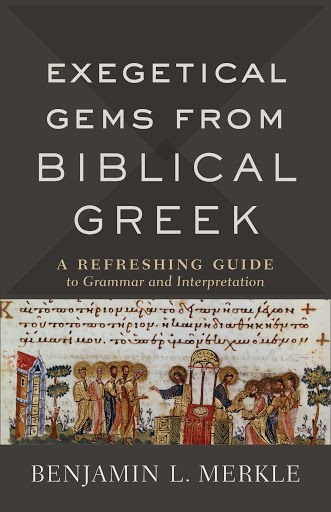EXEGETICAL GEMS FROM BIBLICAL GREEK: A Refreshing Guide to Grammar and Interpretation by Benjamin L. Merkle
- Approximate Time Commitment: 5 minutes
In going through its thirty-five chapters you can review your Greek, while at the same time get a deeper understanding of a number of key New Testament passages. This book review was written by Hank Griffith of South Suburban Evangelical Free Church in Apple Valley, Minnesota.
Resource Description
To those of you who have at least an intermediate knowledge of Greek I would highly recommend Exegetical Gems from Biblical Greek is by Benjamin Merkle, Professor of New Testament and Greek at Southeastern Baptist Theological Seminary. This little book of 163 pages reviews most of the main points of Greek grammar by looking at specific passages in the New Testament.
In going through its thirty-five chapters you can review your Greek, while at the same time get a deeper understanding of a number of key New Testament passages. I found the study of some of the passages not only helped me better understand challenging points of theology, but also gave me a deeper understanding of the Christian life.
Evangelical Bible scholar, Thomas R. Schreiner, a man far better versed in New Testament Greek than I am, wrote: “The book is aptly titled: readers are indeed treated to exegetical gems from the Greek text. Merkle also provides a concise review of Greek grammar as he discusses particular biblical texts. This is a most helpful way to keep up review one’s Greek and to learn more about the biblical text at the same time.”
Just one specific point: when I studied Greek a half century ago (yikes!) I was taught that the aorist tense is a past tense that conveys once-for-all punctiliar action. Since that time Greek scholars have studied more deeply how the aorist is actually used in the New Testament and in other documents of the period. In doing so they have learned that the aorist tense was also often used to communicate a summary statement that would allow an undetermined period of time. I was amazed to read that the aorist, the most common tense in New Testament Greek, actually has five different possible uses. This makes a difference in the way we understand certain passages.
If you spent two, three, or more years studying Greek in seminary or Bible college, I urge you to keep up your Greek. A knowledge of New Testament Greek can be a valuable tool in your life and ministry. If your Greek is rusty, purchase this book and read it more than once as I did.
Only logged in customers who have purchased this product may leave a review.



Reviews
There are no reviews yet.